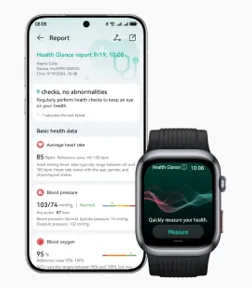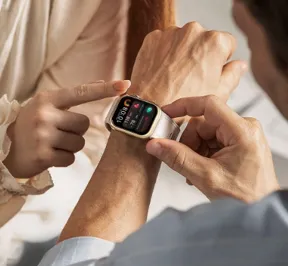Smartwatches have become indispensable tools for those looking to take charge of their health. With an array of features, these devices go beyond telling time to monitor heart health, track sleep, measure fitness levels, and even assess stress. Choosing the right smartwatch tailored to your specific needs can empower you to make informed decisions about your well-being. When selecting a smartwatch, it’s essential to consider its health-focused capabilities. From advanced heart rate monitoring to non-invasive blood pressure tracking, modern smartwatches integrate technology into everyday life to help users lead healthier, more balanced lifestyles. As technology advances, these features become more accurate and accessible, making health management easier than ever.
Heart Rate Monitoring for Cardiovascular Insights
Heart rate monitoring is a cornerstone of any health-focused smartwatch. This feature helps users gain valuable insights into their cardiovascular health by tracking heart rate patterns and variations throughout the day.
Continuous Tracking for Real-Time Data
Continuous heart rate tracking provides real-time data that is crucial for understanding how your heart responds to various activities, from exercise to relaxation. This information can guide you in optimizing workouts, identifying stress levels, and ensuring a balanced lifestyle. Modern smartwatches leverage sophisticated sensors to deliver accurate readings. By analyzing these metrics over time, users can spot trends and adjust their routines to align with their health goals, enhancing overall cardiovascular wellness.
Alerts for Abnormal Heart Rate
Many smartwatches include features that alert users to abnormal heart rates, such as tachycardia or bradycardia. These notifications act as early warning systems, prompting timely action if irregularities occur. This proactive approach to heart health allows users to seek medical advice or make lifestyle changes before minor issues escalate into serious concerns. With continuous improvements in sensor technology, smartwatches are becoming reliable companions for cardiovascular health monitoring.
Advanced Sleep Tracking for Better Rest
Sleep quality significantly impacts overall health, and smartwatches with advanced sleep tracking features can provide deep insights into nightly rest.
Analyzing Sleep Stages and Patterns
Smartwatches analyze sleep stages, including light, deep, and REM sleep, to give users a comprehensive understanding of their rest cycles. By identifying disruptions and imbalances, these devices help users create better sleep habits. Using this data, individuals can adjust their routines, such as setting consistent bedtimes or limiting screen time before bed, to improve sleep quality. These changes not only enhance energy levels but also support mental clarity and long-term health.
Tips for Using Sleep Data Effectively
To make the most of sleep tracking, users should regularly review their data and implement actionable changes. Many smartwatches provide personalized recommendations to optimize sleep, including relaxation exercises or reminders to wind down. By consistently using these insights, users can establish a healthier sleep schedule, leading to better recovery and overall wellness.
Blood Pressure and Oxygen Level Monitoring
For individuals prioritizing cardiovascular and respiratory health, smartwatches with blood pressure and SpO2 monitoring capabilities offer significant value.
Non-Invasive Blood Pressure Tracking
Smartwatches like the Huawei Watch D2 bring cutting-edge non-invasive blood pressure monitoring to your wrist. These devices allow users to measure their blood pressure quickly and conveniently, anytime and anywhere. The Huawei Watch D2 features 24-hour automatic monitoring, providing daytime, nighttime, and 24-hour average systolic and diastolic blood pressure values. This comprehensive tracking helps users understand their cardiovascular health trends over time. For those wondering how to cure high blood pressure in 3 minutes, it’s crucial to understand that managing blood pressure is a long-term commitment. Smartwatches play a vital role in this process by delivering real-time insights and encouraging healthier choices, such as regular exercise, stress management, and improved dietary habits.

SpO2 Monitoring for Respiratory Health
SpO2 monitoring is another critical feature in modern smartwatches, offering insights into blood oxygen levels. Low SpO2 readings can indicate potential respiratory issues or poor oxygenation during sleep, prompting users to investigate further. By tracking SpO2 levels during physical activity, smartwatches help users optimize workouts and avoid overexertion. For those with chronic conditions, consistent monitoring can provide peace of mind and a better understanding of respiratory health.
Stress and Wellness Management Features
Managing stress is integral to overall wellness, and smartwatches offer innovative tools to help users stay calm and balanced.
Stress Level Monitoring and Notifications
Smartwatches measure stress levels by analyzing heart rate variability and other metrics. They notify users when stress levels rise, encouraging them to take proactive steps to relax and refocus. By recognizing stress patterns, users can develop healthier coping mechanisms and reduce the negative impact of stress on their physical and mental health.
Guided Mindfulness Tools
Many smartwatches include guided mindfulness exercises, such as breathing techniques or meditation sessions. These tools help users manage stress effectively, improving emotional well-being and fostering resilience. Integrating these features into daily routines promotes a more mindful approach to life, enhancing both mental clarity and overall happiness.
Activity and Fitness Tracking for an Active Lifestyle
Smartwatches are powerful tools for promoting physical fitness. They provide detailed activity metrics, such as step counting, calorie burn, and exercise performance, making it easier to stay motivated and track progress. Many devices also include guided workout programs, offering tailored routines for various fitness levels. These programs not only keep users engaged but also help them achieve their fitness goals efficiently. By combining personalized insights with motivational tools, smartwatches inspire users to maintain an active and healthy lifestyle.
Conclusion
Selecting the right health-focused smartwatch involves understanding your specific needs and finding a device that offers the features to support them. From heart rate monitoring and sleep tracking to blood pressure analysis and stress management, these devices provide essential insights that empower users to lead healthier lives. The Huawei Watch D2 exemplifies the potential of health-focused smartwatches, with its advanced blood pressure tracking and comprehensive health management tools. By embracing the capabilities of modern smartwatches, individuals can take charge of their well-being with confidence and convenience. Whether you’re striving for better fitness, improved sleep, or balanced mental health, a smartwatch can be your trusted partner on the journey to a healthier life.
